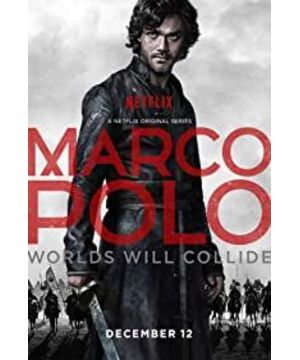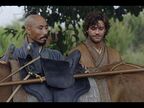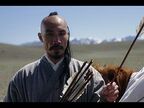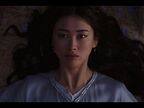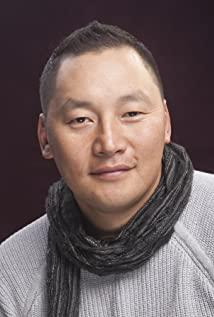============= gorgeous dividing line====== ======== The
following content is from Baidu Encyclopedia: In the
face of doubt, it is surprising that the attitude of Chinese historians is intriguing. The answer of Qian Mu, the master of traditional Chinese studies, is witty and may represent their common thoughts and opinions. He said that he "would rather" believe that he had actually been to China because he had a "warm respect" for Marco Polo. Therefore, there are only a few people such as Professor Yang Zhijiu who really explain and refute the above-mentioned questioning "Rising up". The two sides used various methods such as newspapers, television, writings, academic seminars, etc., to conduct fierce debates for hundreds of years. The two sides' doubts and rebuttals are concentrated into four points. Other questions and arguments are all expansions on the basis of four points. The summary is as follows:
A. Claims to be trusted by the Khan and has served in official positions. But there is no record of Marco Polo in any Eastern historical books.
Skeptic: In the vast expanse of ancient Chinese historical books, countless scholars have searched for decades, but they have not found a piece of historical data about Marco Polo that can be verified.
Affirmative: In order to refute the doubts about Marco Polo’s records in the history books, Professor Yang Hao spent his first thoughts on the classics, and finally found a record in the Yongle Dadian fragment "Zhan Chi": "Urude, Abi, and the firemen take the way "Ma Erba's going to the throne of Aluhon the Great" is consistent with the record in "Marco Polo's Travels", which can prove that he has been to China. But this is the only solitary evidence found by all Shi Shuhao's first Qiaojing. In addition, "Marco Polo's Travels" said that Kublai Khan in Mongolia, because of his knowledge of the sea, asked him to lead the mission to escort the Mongolian princess to Persia to marry, and this lone certificate did not mention Marco Polo. Luo's name.
Skeptics: "However, it is obviously unconvincing to use Ming Dynasty history books to confirm Yuan Dynasty characters. What's more important is that, like other history books, the name of Marco Polo is not mentioned in this record, which can only explain the matter. Consistent with his narrative, it is just that he tells well-known stories (such as the expedition to Japan and the assassination of the king), but it cannot prove that Marco Polo has any connection with this matter, and it cannot be used as direct evidence that he has been to China. "(Note: Beijing Youth Daily 2004-08-13)
The affirmative: Mr. Yang Zhijiu mentioned this "conclusive evidence" in almost all of his critical essays, using it as a lethal weapon to refute the "skeptics". Although this official document does not mention Marco Polo in a word, it can at least explain that the content recorded in "Marco Polo's Travels" about them following the Persian envoys to return to China is consistent. Based on this material, scholars later inferred that Marco Polo returned from Quanzhou, China from the sea to China in early 1291. Regarding this piece of material, the academic community agrees that it is the only indirect record of Marco Polo found in Chinese literature so far. This is also the only place where "affirmative" scholars at home and abroad feel gratified. At least this piece of material can be used to resist the pursuit of "skeptic" scholars.
Skeptic: Marco Polo claims to have been highly regarded by Kublai Khan in China for 17 years, but there is no history book of the Yuan Dynasty that can't find even one record for textual research. Including him claiming to be an official in Yangzhou for three years, the local chronicles of Yangzhou are also unchecked. Regarding Marco Polo's lie that he had been in Yangzhou for three years, neither the history books nor the local chronicles of Yangzhou recorded it.
Affirmative: Marco Polo was probably just a small official in charge of salt affairs, because he wrote about the heads of salt-producing regions Lu, Haimen, and Zhenzhou in his travel notes. The small officials about salt affairs will not be included in the record. Historical.
Skeptic: Marco Polo is a Semu. As the "second class" of the aristocratic class in the Yuan Dynasty, Semu also claimed to be the local director of Yangzhou. Even if he does not hold important positions, the Yangzhou local chronicles clearly record the full list of officials of the Yuan Dynasty, including foreigners, but there is still no record of him.
Affirmative: Later generations mistakenly copied Marco Polo's original words "to be ordered to'live' in Yangzhou for three years" into "to be ordered to'rule' Yangzhou for three years" and caused a misunderstanding.
Skeptic: Why did he "receive" Yangzhou just to "live"? What did he "live" in Yangzhou for three years? And his impression of prosperous Yangzhou in three years is only that "there is nothing worth mentioning" except for the production of horse ornaments.
Affirmative: As a businessman, he has a special interest in horse ornaments. As for the others, it is a negligence in recording.
B. Some things with Chinese characteristics are not mentioned in the book, such as the Great Wall, chopsticks, tea, Chinese medicine (such as acupuncture), Chinese characters, printing, women's foot binding, fishing with cormorants, etc.
Skeptic: And these things are recorded in the travels of Persian merchants in the same period and the travels of the British Magarny after his visit to China in 1792.
Affirmative: The Great Wall is not mentioned because the Yuan Great Wall has been in disrepair for a long time, and the civil structure of the Yuan Great Wall is not as eye-catching as the masonry structure of the Ming Great Wall, and it has not attracted enough attention from him.
Skeptics: The Golden Great Wall (also called Jinjiehao) built by the Jinren was not seriously damaged by the war. If Marco Polo really traveled all over China, he would have to pass through the Great Wall several times, and it would be impossible to ignore it. While Zhang Dehui, a famous official of the Yuan Dynasty, once recorded that "on the way to the north of Mobei, there is a great wall, and the hope is endless." Wang Yun wrote: "There is a northern boundary ten miles away from the southwest of Hengzhou, and it is still Wanran."
Affirmative: The reason for not mentioning tea is that the Mongols do not like to drink tea, so Marco Polo has no impression of this.
Skeptics: Kublai Khan began to buy tea in 1268. In 1275, he began to buy tea from all over the south of the Yangtze River. In 1276, Changhu and other tea gardens were established to "picking tea buds for the inner government"; and 8-9 The "Insights from China and India" written by Sulaiman, a businessman from the Western Regions of the century, clearly mentioned tea.
Affirmative: Regarding Chinese calligraphy and printing, Marco Polo does not know Chinese characters, so he will not record Chinese calligraphy and printing.
Skeptic: However, when he wrote books, especially when Europe was in the age of manuscripts, he would inevitably think of the mysterious Chinese calligraphy and advanced printing techniques, and the French missionary Lu, who went to Mongolia 30 years before him. Buluqiqi "Journey to the East" records Chinese calligraphy and printing.
Affirmative: For chopsticks, foot binding, cormorants, etc., Marco Polo has only used knives and forks for 17 years, and has never seen chopsticks; in 17 years, he has never seen any woman with foot binding; he is in the city People, not fishermen and so on.
Skeptics: Other foreigners, such as the 14th century British traveler Mandeville in "Jazz Travels", and the British Colonel Yule, who retired in 1862, mentioned these things in "China and the Road to China". .
Affirmative: "Marco Polo's Travels" may have been recorded, but it has been copied by countless people after it was written. It may be a mistake in the copying, or the original manuscript was lost.
C. The Xiangyang artillery offering is a fabricated that is obviously contrary to historical facts. In addition, a series of historical facts were fabricated.
Skeptic: Marco Polo claimed that the Mongolian army had been attacking Xiangyang for a long time, so he presented a powerful rappel to force the defender of Xiangyang to surrender. The fact is that when the Mongolian army attacked Xiangyang in 1273, he was still on his way to China, and it was naturally not him that offered the stone thrower, but the Persian Yismain and Ara Vadim, "The History of the Yuan Dynasty · Fang Ji Biography" "I think of Ma Yin, Huihui, and Xu Liren of the Western Regions. Good at making artillery.... Three years in the Tianli calendar, with a swift death." It is written very clearly in black and white.
Affirmative: Will Yisi Ma Yin be Marco Polo
Skeptic: It is very clear in "Yuan Shi" that Yisi Ma Yin died in the eleventh year of Yuan Shizu to Yuan Dynasty, that is, 1274 AD了 ("Death by disease"). The name of Yisi Main's son Buber sounds similar to "Marco", but this person cannot be equated with Marco Polo, because he died three years in the Tianli calendar. "Tian Li" is the year name of Yuan Wen Zong Tu Tie Mu'er. The third year of Tian Li is 1330 AD, and Marco Polo died in 1324 AD. The more proof that there is no relationship between them is: Marco Polo died in Europe, while Buber died in China.
Affirmative: This was added at random when the "Travel Notes" was copied by later generations. Because Marco Polo's manuscript has been lost.
Skeptics: There are traces of hearsay in the book. The time of Li Songshou's rebellion was postponed for ten years; the death of Genghis Khan was described as the death of an arrow in the knee; the legendary African priest King John was grafted into The grandfather of Kublai’s grandson, Korigis, and the record of Qutuo’s defeat by Nahai happened after he returned to China.
Affirmative: All the guesses, assumptions and errors in the book are the faults of later generations in the copy. .
Skeptic: The "Travel Notes" records the Christian church in Zhenjiang and some "suspicious", "trembling and dodging" Christians. The Yuan Dynasty’s persecution of Christians could not be proved by any historical materials.
Affirmatives: They are actually Manichaeans, because the sect is considered a cult and they dare not engage in public activities. This record is informative and vivid. It is impossible to grasp such first-hand information without ever being in China. This just shows that Marco Polo has been to China.
Skeptic: However, it was the end of Yuan Dynasty that the Chinese regarded Manichaeism as a cult. The early Mongolian government adopted a tolerant attitude towards various religions and treated all religions equally. It is advocated to distinguish the pros and cons of different religions through debate, let alone the extreme persecution measures such as the abolition of religions. Kublai Khan once said: "There are always prophets in the world, and I pay tribute." Therefore, even Manichaeans do not need to "tremble and evade" in a relaxed religious atmosphere.
D. Many Chinese place names in "Marco Polo's Travels" use Persian names. It is possible that Marco has only been to Islamic countries in Central Asia.
Skeptic: Marco Polo claims to know Mongolian and Chinese. He wrote this book in French in Italy. Many of the names in the book are in Persian. We noticed that most of the merchants were Persians at that time, which can prove The content of the travel notes is audible.
The affirmative: Marco Polo is a sorrowful person. He also dealt with in the Yuan Dynasty aristocratic color eyes. He himself belongs to the nobles of Semu. So he doesn't know the Chinese name of many Chinese names, only the Persian name.
E. Some other doubts
1. The book rarely mentions Marco Polo’s father and uncle, nor does it mention their business, nor any business activities that fit their status in China, which just means that they have never been to China, so There is no way to talk about business.
2. Marco Polo did not carry anything unique to China when he returned to China. The Marco Polo jars in the Venetian Treasure Museum were actually 14th century Dehua white porcelain, which had nothing to do with him, but he brought back some of them. The gems are a specialty of Persia.
3. The narratives in the book are full of exaggerated plots and false statements, many of which are very exaggerated and surprising even today. The word "million" was used every so often that people gave him the nickname "Mr. Million" to tease and ridicule him.
4. In 1999, the United States formed a scientific expedition team to re-take the road that Marco Polo had walked in the past, but it was only by means of modern transportation, but the journey was also very difficult. After the inspection, the 10 expedition team members and 22 back-up experts agreed that Marco Polo came to China through this route "it is simply unimaginable." Throughout the live broadcast, 10,000 netizens who believed in Marco Polo voted after watching the live broadcast, and 65% believed that he had never been to China.
====================Quotation completed================
Whether it is from the positive or negative, people have a basis Yes, and me, no!
I can only look at the problem from the perspective of both sides, then: the established facts before the evidence is established.
If you think Marco Polo has been to China, he should have not been to China before, and vice versa.
In summary, I think Marco Polo has never been to China because: If this product has been to China, how can Chinese and foreign scholars find so many paradoxes that he has never been to China? If this guy has been to China, how can scholars who hold affirmative views be ambiguous about the "various issues" that they have been to China, and can only use the word "possibly"? !
It is a good thing to let a foreigner help us brag, the key is that the bragging is so big that all people on earth take it seriously! The Association of Scholars has been established! Therefore, I personally think that in such a juncture, as the Chinese people themselves, don't help others foreigners and cause chaos to them, do you think so?
View more about Marco Polo reviews


